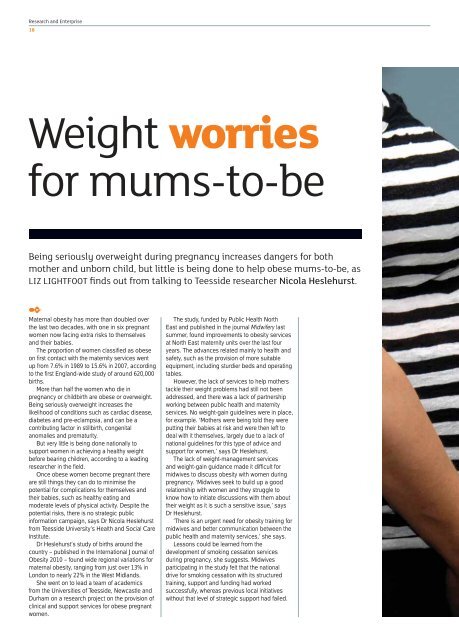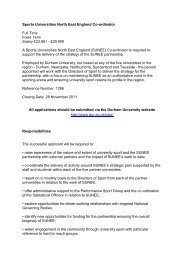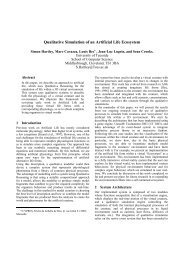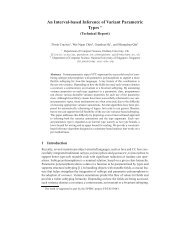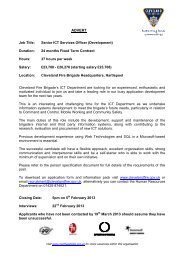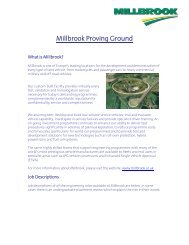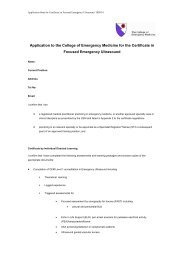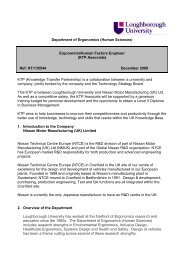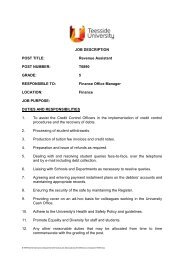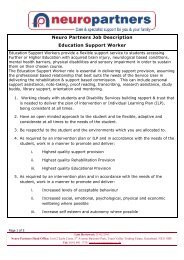Research and Enterprise, Issue 9 - University of Teesside
Research and Enterprise, Issue 9 - University of Teesside
Research and Enterprise, Issue 9 - University of Teesside
Create successful ePaper yourself
Turn your PDF publications into a flip-book with our unique Google optimized e-Paper software.
<strong>Research</strong> <strong>and</strong> <strong>Enterprise</strong><br />
18<br />
Weight worries<br />
for mums-to-be<br />
Being seriously overweight during pregnancy increases dangers for both<br />
mother <strong>and</strong> unborn child, but little is being done to help obese mums-to-be, as<br />
LIZ LIGHTFOOT finds out from talking to <strong>Teesside</strong> researcher Nicola Heslehurst.<br />
✒<br />
Maternal obesity has more than doubled over<br />
the last two decades, with one in six pregnant<br />
women now facing extra risks to themselves<br />
<strong>and</strong> their babies.<br />
The proportion <strong>of</strong> women classified as obese<br />
on first contact with the maternity services went<br />
up from 7.6% in 1989 to 15.6% in 2007, according<br />
to the first Engl<strong>and</strong>-wide study <strong>of</strong> around 620,000<br />
births.<br />
More than half the women who die in<br />
pregnancy or childbirth are obese or overweight.<br />
Being seriously overweight increases the<br />
likelihood <strong>of</strong> conditions such as cardiac disease,<br />
diabetes <strong>and</strong> pre-eclampsia, <strong>and</strong> can be a<br />
contributing factor in stillbirth, congenital<br />
anomalies <strong>and</strong> prematurity.<br />
But very little is being done nationally to<br />
support women in achieving a healthy weight<br />
before bearing children, according to a leading<br />
researcher in the field.<br />
Once obese women become pregnant there<br />
are still things they can do to minimise the<br />
potential for complications for themselves <strong>and</strong><br />
their babies, such as healthy eating <strong>and</strong><br />
moderate levels <strong>of</strong> physical activity. Despite the<br />
potential risks, there is no strategic public<br />
information campaign, says Dr Nicola Heslehurst<br />
from <strong>Teesside</strong> <strong>University</strong>’s Health <strong>and</strong> Social Care<br />
Institute.<br />
Dr Heslehurst’s study <strong>of</strong> births around the<br />
country – published in the International Journal <strong>of</strong><br />
Obesity 2010 – found wide regional variations for<br />
maternal obesity, ranging from just over 13% in<br />
London to nearly 22% in the West Midl<strong>and</strong>s.<br />
She went on to lead a team <strong>of</strong> academics<br />
from the Universities <strong>of</strong> <strong>Teesside</strong>, Newcastle <strong>and</strong><br />
Durham on a research project on the provision <strong>of</strong><br />
clinical <strong>and</strong> support services for obese pregnant<br />
women.<br />
The study, funded by Public Health North<br />
East <strong>and</strong> published in the journal Midwifery last<br />
summer, found improvements to obesity services<br />
at North East maternity units over the last four<br />
years. The advances related mainly to health <strong>and</strong><br />
safety, such as the provision <strong>of</strong> more suitable<br />
equipment, including sturdier beds <strong>and</strong> operating<br />
tables.<br />
However, the lack <strong>of</strong> services to help mothers<br />
tackle their weight problems had still not been<br />
addressed, <strong>and</strong> there was a lack <strong>of</strong> partnership<br />
working between public health <strong>and</strong> maternity<br />
services. No weight-gain guidelines were in place,<br />
for example. ‘Mothers were being told they were<br />
putting their babies at risk <strong>and</strong> were then left to<br />
deal with it themselves, largely due to a lack <strong>of</strong><br />
national guidelines for this type <strong>of</strong> advice <strong>and</strong><br />
support for women,’ says Dr Heslehurst.<br />
The lack <strong>of</strong> weight-management services<br />
<strong>and</strong> weight-gain guidance made it difficult for<br />
midwives to discuss obesity with women during<br />
pregnancy. ‘Midwives seek to build up a good<br />
relationship with women <strong>and</strong> they struggle to<br />
know how to initiate discussions with them about<br />
their weight as it is such a sensitive issue,’ says<br />
Dr Heslehurst.<br />
‘There is an urgent need for obesity training for<br />
midwives <strong>and</strong> better communication between the<br />
public health <strong>and</strong> maternity services,’ she says.<br />
Lessons could be learned from the<br />
development <strong>of</strong> smoking cessation services<br />
during pregnancy, she suggests. Midwives<br />
participating in the study felt that the national<br />
drive for smoking cessation with its structured<br />
training, support <strong>and</strong> funding had worked<br />
successfully, whereas previous local initiatives<br />
without that level <strong>of</strong> strategic support had failed.


